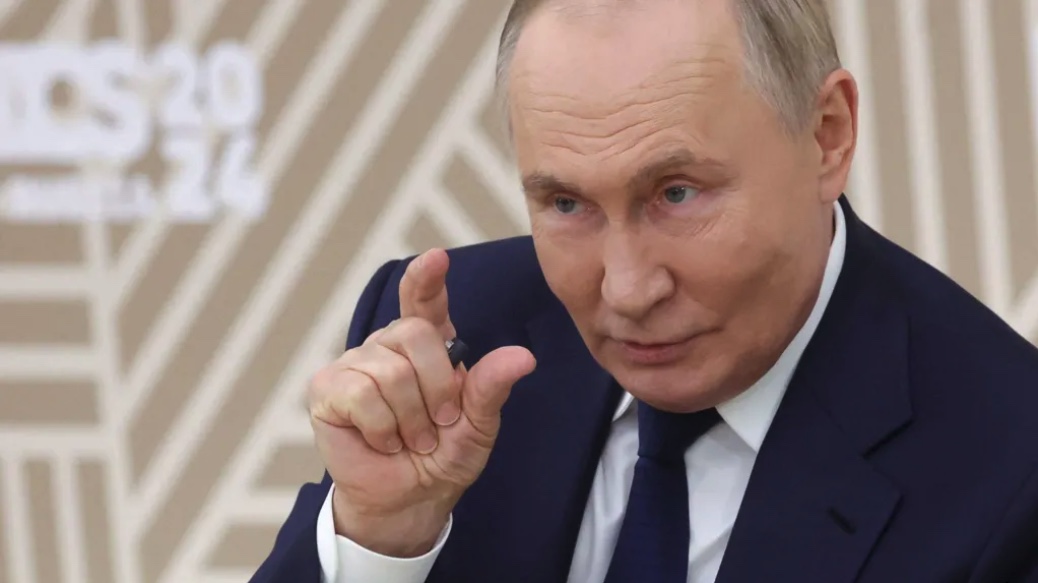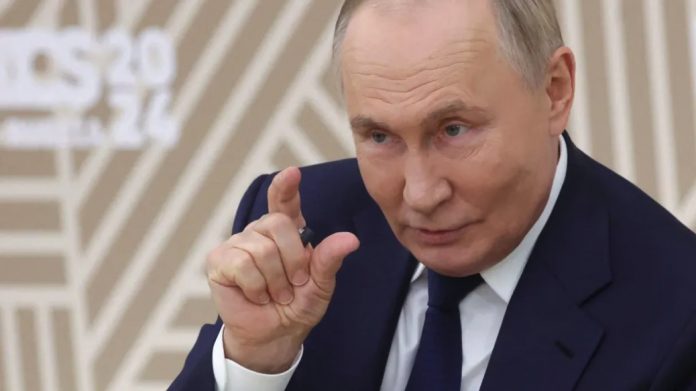ลองนึกภาพว่าคุณคือวลาดิเมียร์ ปูติน — โลกตะวันตกตราหน้าคุณเป็น “คนนอก” จากการบุกยูเครนและคว่ำบาตรเศรษฐกิจรัสเซียเพื่อพยายามตัดขาดประเทศของคุณจากตลาดโลก อีกทั้งยังมีหมายจับจากศาลอาญาระหว่างประเทศ แต่คุณจะทำอย่างไรเพื่อแสดงให้เห็นว่าแรงกดดันนั้นใช้ไม่ได้ผล? คำตอบคือ จัดการประชุมสุดยอด
ในสัปดาห์นี้ ปูตินจะต้อนรับผู้นำกว่า 20 ประเทศที่เข้าร่วมการประชุมสุดยอด Brics ที่เมืองคาซาน โดยมีผู้นำระดับสูงอย่าง ประธานาธิบดีจีน สี จิ้นผิง, นายกรัฐมนตรีอินเดีย นเรนทรา โมดี และประธานาธิบดีอิหร่าน มาซูด เปเซเชียน เป็นแขกสำคัญ ทำให้ทางเครมลินออกมาระบุว่านี่เป็น “หนึ่งในเหตุการณ์นโยบายต่างประเทศที่ใหญ่ที่สุดในประวัติศาสตร์ของรัสเซีย”
คริส วีเฟอร์ หุ้นส่วนผู้ก่อตั้งบริษัท Macro-Advisory กล่าวว่า “ข้อความที่ชัดเจนคือ ความพยายามในการแยกรัสเซียออกจากเวทีโลกนั้นล้มเหลว” วีเฟอร์มองว่าการประชุมครั้งนี้เป็นส่วนหนึ่งของการประกาศจากเครมลินว่ารัสเซียสามารถต้านทานมาตรการคว่ำบาตรได้ แม้จะมีปัญหาภายในที่เกิดจากผลกระทบของมาตรการเหล่านี้ แต่บนเวทีการเมืองระหว่างประเทศ รัสเซียยังมีพันธมิตรและเพื่อนบ้านที่พร้อมสนับสนุน
ใครคือพันธมิตรของรัสเซีย
กลุ่ม Brics ประกอบด้วย บราซิล รัสเซีย อินเดีย จีน และแอฟริกาใต้ โดยถูกมองว่าเป็นกลุ่มที่สามารถถ่วงดุลกับอิทธิพลของโลกตะวันตกได้ และยังมีการขยายกลุ่มสมาชิกใหม่อย่าง อียิปต์ เอธิโอเปีย อิหร่าน และสหรัฐอาหรับเอมิเรตส์ ซึ่งซาอุดีอาระเบียก็ได้รับเชิญให้เข้าร่วมกลุ่มด้วยเช่นกัน
สมาชิก Brics คิดเป็น 45% ของประชากรโลก โดยมีมูลค่าเศรษฐกิจรวมกันกว่า 28.5 ล้านล้านดอลลาร์ (22 ล้านล้านปอนด์) ซึ่งเท่ากับประมาณ 28% ของเศรษฐกิจโลก
เจ้าหน้าที่รัสเซียระบุว่า มีอีกกว่า 30 ประเทศที่ต้องการเข้าร่วมกลุ่ม Brics หรือมีความสนใจที่จะเชื่อมสัมพันธ์กับกลุ่ม โดยบางประเทศก็เข้าร่วมการประชุมครั้งนี้ที่คาซาน และสามารถคาดเดาได้ว่าจะมีการพูดถึงแนวคิดเรื่องการที่กลุ่ม Brics เป็น “เสียงส่วนใหญ่ของโลก” (Global Majority)
แต่คำถามคือ นอกเหนือจากการจัดการประชุมเพื่อสร้างเวทีทางการทูตให้กับปูตินแล้ว การประชุมครั้งนี้จะบรรลุผลอะไรได้อีกหรือไม่
การพยายามทำลายอิทธิพลของสกุลเงินดอลลาร์
ด้วยความมุ่งหวังที่จะลดแรงกดดันจากมาตรการคว่ำบาตรทางเศรษฐกิจจากตะวันตก ผู้นำเครมลินหวังจะชักชวนสมาชิก Brics ให้สนับสนุนระบบการชำระเงินที่ไม่ต้องพึ่งพาสกุลเงินดอลลาร์
วีเฟอร์กล่าวว่า “ปัญหาหลายอย่างของเศรษฐกิจรัสเซียเกี่ยวพันกับการค้าข้ามพรมแดนและการชำระเงิน และส่วนหนึ่งของปัญหานี้ก็คือสกุลเงินดอลลาร์สหรัฐ”
“กระทรวงการคลังของสหรัฐฯ มีอิทธิพลอย่างมากต่อการค้าระหว่างประเทศก็เพราะว่าดอลลาร์สหรัฐฯ เป็นสกุลเงินหลักที่ใช้ในการชำระค่าสินค้าและบริการ รัสเซียจึงพยายามที่จะลดความสำคัญของสกุลเงินดอลลาร์และต้องการให้กลุ่ม Brics สร้างระบบการค้าข้ามพรมแดนที่ไม่เกี่ยวข้องกับดอลลาร์ ยูโร หรือสกุลเงินของประเทศในกลุ่ม G7 เพื่อทำให้มาตรการคว่ำบาตรนั้นไม่มีผลกระทบมากนัก” วีเฟอร์กล่าวเสริม
กลุ่ม Brics เต็มไปด้วยความขัดแย้งภายใน
อย่างไรก็ตาม กลุ่ม Brics เองก็เผชิญกับความขัดแย้งและความแตกต่างระหว่างสมาชิก ซึ่งไม่ได้เป็นกลุ่มที่มีความคิดหรือเป้าหมายเหมือนกันเสมอไป จิม โอนีล อดีตหัวหน้านักเศรษฐศาสตร์ของ Goldman Sachs กล่าวเสริมว่า “ในบางแง่มุม การที่จีนและอินเดียไม่ค่อยจะเห็นตรงกัน ก็ถือเป็นข้อดีสำหรับโลกตะวันตก เพราะหากทั้งสองประเทศนี้ร่วมมือกันอย่างจริงจัง กลุ่ม Brics จะมีอิทธิพลอย่างมหาศาล”
“จีนและอินเดียต่างก็พยายามหลีกเลี่ยงไม่โจมตีกันเอง แต่การที่จะทำให้ทั้งสองฝ่ายร่วมมือกันในด้านเศรษฐกิจนั้นเป็นเรื่องที่ท้าทายอย่างยิ่ง” โอนีลกล่าว
โอนีลเป็นผู้คิดคำว่า “Bric” ขึ้นมาในช่วงเปลี่ยนผ่านของศตวรรษ โดยเชื่อว่าเศรษฐกิจเกิดใหม่ทั้งสี่ควรมีบทบาทสำคัญในเวทีการกำหนดนโยบายระดับโลก ต่อมาจึงเกิดการรวมกลุ่ม “Brics” ขึ้นในรูปแบบองค์กรจริงๆ เมื่อแอฟริกาใต้เข้ามาร่วมด้วย ซึ่งมีจุดมุ่งหมายที่จะท้าทายอิทธิพลของกลุ่ม G7 (กลุ่มประเทศเศรษฐกิจชั้นนำ ได้แก่ แคนาดา ฝรั่งเศส เยอรมนี อิตาลี ญี่ปุ่น สหราชอาณาจักร และสหรัฐฯ)
ไม่ใช่แค่จีนกับอินเดียที่ไม่ลงรอยกัน แต่สมาชิกใหม่อย่างอียิปต์และเอธิโอเปียก็มีความตึงเครียดระหว่างกันเช่นกัน และแม้จะมีความพยายามสร้างความปรองดอง แต่ความขัดแย้งระหว่างอิหร่านและซาอุดีอาระเบียก็ยังคงมีอยู่
“ความคิดที่ว่าสมาชิก Brics ทุกประเทศจะเห็นพ้องกันในเรื่องสำคัญอย่างเป็นเอกฉันท์นั้นดูจะเป็นไปไม่ได้” โอนีลให้ความเห็น
แม้ว่ารัสเซียจะกล่าวถึงแนวคิด “ระเบียบโลกใหม่” ด้วยความรู้สึกต่อต้านตะวันตก แต่สมาชิก Brics บางประเทศ เช่น อินเดีย กลับให้ความสำคัญกับการรักษาความสัมพันธ์ทางการเมืองและเศรษฐกิจกับโลกตะวันตก
ดังนั้น ในการประชุมที่คาซานครั้งนี้ ภารกิจของวลาดิเมียร์ ปูติน คือการพยายามมองข้ามความแตกต่างเหล่านี้และสร้างภาพลักษณ์ของความสามัคคี พร้อมทั้งแสดงให้ประชาชนชาวรัสเซียและชุมชนระหว่างประเทศเห็นว่ารัสเซียไม่ได้ถูกโดดเดี่ยวอย่างที่ตะวันตกพยายามทำให้เป็น
Putin gathers allies to show West pressure isn’t working

Imagine you’re Vladimir Putin.
The West has dubbed you a pariah for invading Ukraine. Sanctions are aiming to cut off your country’s economy from global markets.
And there’s an arrest warrant out for you from the International Criminal Court.
How can you show the pressure is not working? Try hosting a summit.
This week in the city of Kazan President Putin will greet more than 20 heads of state at the Brics summit of emerging economies. Among the leaders invited are China’s Xi Jinping, Indian Prime Minister Narendra Modi and Iranian President Masoud Pezeshkian.
The Kremlin has called it one of the “largest-scale foreign policy events ever” in Russia.
“The clear message is that attempts to isolate Russia have failed,” thinks Chris Weafer, founding partner of consultancy firm Macro-Advisory.
“It’s a big part of the messaging from the Kremlin that Russia is withstanding sanctions. We know there are severe cracks beneath the surface. But at a geopolitical level Russia has all these friends and they’re all going to be Russia’s partners.”
So, who are Russia’s friends?
Brics stands for Brazil, Russia, India, China and South Africa. The grouping, often referred to as a counterweight to the Western-led world, has expanded to include Egypt, Ethiopia, Iran and the United Arab Emirates.
Saudi Arabia, too, has been invited to join.
The Brics nations account for 45% of the global population. Added together, members’ economies are worth more than $28.5tn (£22tn). That’s around 28% of the global economy.
Russian officials have indicated that another 30 countries want to join Brics or seek closer ties with the club. Some of these nations will take part in the summit. In Kazan this week expect a lot of talk about Brics representing the “global majority”.
But apart from providing Vladimir Putin his moment on the geopolitical stage, what is the event likely to achieve?
Keen to ease the pressure from Western sanctions, the Kremlin leader will hope to convince Brics members to adopt an alternative to the dollar for global payments.
“A lot of the problems Russia’s economy is facing are linked to cross-border trade and payments. And a lot of that is linked to the US dollar,” says Mr Weafer.
“The US Treasury has enormous power and influence over global trade simply because the US dollar is the main currency for settling that. Russia’s main interest is in breaking the dominance of the US dollar. It wants Brics countries to create an alternative trade mechanism and cross-border settlement system that does not involve the dollar, the euro or any of the G7 currencies, so that sanctions won’t matter so much.”
But critics point to differences within Brics. “Likeminded” is not a word you would use to describe the current membership.
“In some ways it’s a good job for the West that China and India can never agree about anything. Because if those two were really serious, Brics would have enormous influence,” notes Jim O’Neill, former Chief Economist of Goldman Sachs.
“China and India are doing their best to avoid wanting to attack each other a lot of the time. Trying to get them to really co-operate on economic things is a never-ending challenge.”
It was Mr O’Neill who, at the turn of the century, dreamt up the acronym “Bric” for four emerging economies he believed should be “brought into the centre of global policy making”.
But the four letters would take on a life of their own, after the corresponding nations formed their own Bric group – later Brics, when South Africa joined. They would attempt to challenge the dominance of the G7: the world’s seven largest “advanced” economies (Canada, France, Germany, Italy, Japan, the UK and the US).
It’s not just India and China who have their differences. There is tension between two of the newest Brics members, Egypt and Ethiopia. And, despite talk of detente, Iran and Saudi Arabia have long been regional rivals.
“The idea that they’re all going to fundamentally agree on something of great substance is bonkers really,” believes Mr O’Neill.
And while Russia, fuelled by anti-Western sentiment, talks about creating a “new world order”, other Brics members, like India, are keen to retain good political and economic relations with the West.
In Kazan, Vladimir Putin’s task will be to skim over the differences and paint a picture of unity, while showing the Russian public – and the international community – that his country is far from isolated.
By Steve Rosenberg, BBC News

















